Do Probiotics Help with Bloating?
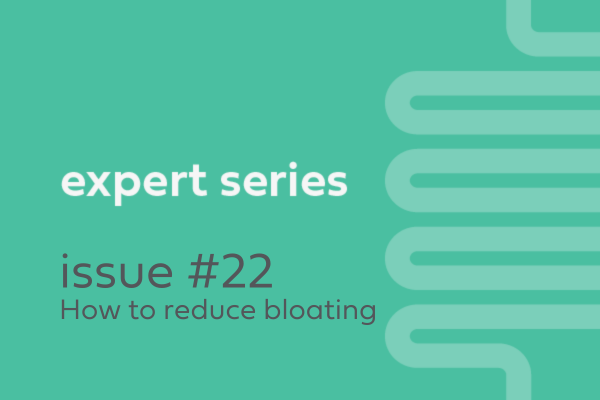
Bloating is one of the most common symptoms we see our customers suffer with – hey, who hasn’t experienced bloating? With bloating, your tummy can look bigger/fuller than usual, causing discomfort from mild to debilitating symptoms. But can taking gut health supplements ease this? Do probiotics help with bloating?
We’re here to answer the most frequently asked questions around bloating, our top tips on how to reduce bloating and how our aguulp supplements can help. But first, let’s take a look at what causes bloating in the stomach in the first place.
What causes bloating in the stomach?
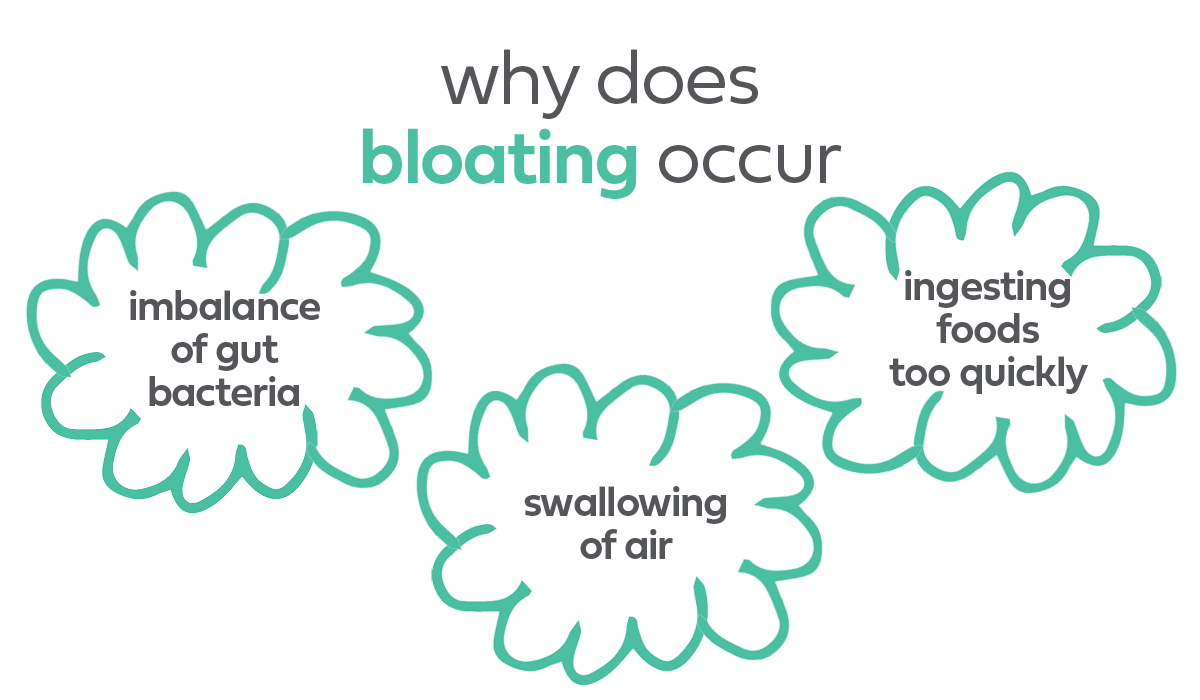
Bloating usually occurs when there is a build-up of gas in the stomach. While gas production is a normal part of the digestive process, too much gas can lead to abdominal discomfort, swelling, abdominal distension, and excessive flatulence. Increased amounts of gas in the stomach can be caused by many factors including:
- Swallowing of air and/or by ingesting foods too quickly: i.e. not chewing food for long enough to enable food particles to be broken down sufficiently at the initial stage of the digestive process.
- Imbalance of gut bacteria: a condition known as dysbiosis. The bacteria that naturally reside in our gut produce gas as a by-product of the food that is digested and fermented there. Too many bad bacteria in the gut (dysbiosis) can lead to excessive levels of gas and bloating.
Factors that contribute to dysbiosis (and therefore bloating as a symptom) include diet, gut motility (constipation), hormone imbalances, stress, intestinal permeability, low stomach acid, and food intolerances.
How to avoid bloating: trigger foods
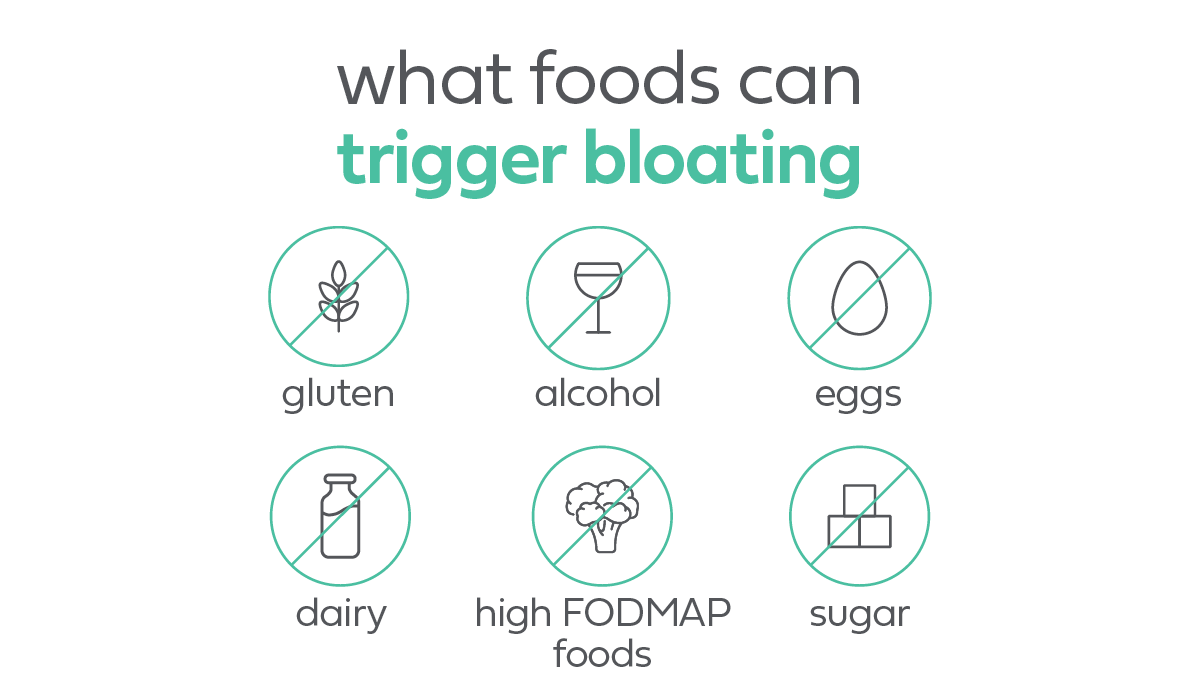
Any foods or substance that a person may be intolerant to can trigger bloating. Being intolerant to a food is when the body is unable to sufficiently break it down. This results in an overgrowth of bacteria in the gut, which in turn increases gas production. However, there are certain groups of foods that are considered to be particularly notorious for triggering bloating. If you want to know how to stop bloating after eating, we recommend being mindful of your consumption of the following foods (please note this is not an exhaustive list):
- Sugar – refined white sugars and simple carbohydrates (such as white bread and white pasta) in the diet encourage the growth of pathogenic bacteria in the gut, leading to dysbiosis.
- High FODMAP foods – (also known as ‘gas-producing foods’). FODMAP stands for Fermentable Oligo-, Di-, Monosaccharides And Polyols. These are specific types of carbohydrates that are found in a variety of foods, but are renowned for causing excessive gas and bloating in certain individuals due to being poorly absorbed in the intestines, leading to fermentation and overgrowth of gut bacteria.
Examples of high FODMAP foods are those that belong to the Brassica family (e.g. cabbage, cauliflower, broccoli, brussels sprouts, etc). Beans, pulses, and lentils are also high in FODMAPS.
Since these foods are highly nutritious, it is best not to eliminate them from the diet long term. If you still want to enjoy these foods but also want to know how to avoid bloating, you should introduce them back into the diet slowly, building up a tolerance to them and allowing the gut bacteria to adapt to them, as our gut bacteria colonies change according to what we eat. There are also ways these foods can be prepared to help improve tolerability, such as pre-soaking them for a period of time prior to cooking/eating – another of our how to reduce bloating top tips.
- Gluten: can be particularly irritating to the digestive system. For some people, it’s not easily broken down in the body (intolerance), leading to an overgrowth of bacteria and increases in gas production.
- Dairy: the inability of the body to break down the sugar in dairy (lactose intolerance) is quite common. Dairy is also known to be inflammatory to the body, in certain individuals and in high amounts. These factors can lead to imbalances of gut bacteria (dysbiosis) and excessive gas production.
- Eggs: contain high amounts of sulphur and protein, both of which are thought to be contributing factors to increased gas production, bloating, and flatulence, as a result of the fermentation process by the bacteria in the gut.
- Spicy foods: can stimulate overproduction of stomach acid, leading to irritation and inflammation of the digestive tract and can contribute to an unhealthy gut environment in which pathogenic bacteria are allowed to multiply.
- Alcohol: directly influences disturbances in the composition of the gut microbiota. Overgrowth of bacteria can also occur as a result of irritation and inflammation that alcohol causes to the gut lining. Read more about the link between alcohol and gut health.
How to reduce bloating: foods to eat
High fibre (soluble): Foods that are high in fibre are particularly beneficial for the health of our gut. This is because fibre helps provide bulk in the bowel and stimulates peristalsis (the natural movement of the bowels for the effective removal and elimination of waste products), helping to prevent constipation, which has been shown to contribute to bloating.
Soluble fibre can be particularly beneficial when it comes to knowing how to reduce bloating. This is because soluble fibre is broken down and digested in the large intestine, which helps to produce a soft stool and good motions. However, it does not produce the type of particles that adhere to the bowel wall and cause inflammation. Good examples of soluble fibre include peeled apples, peeled pears, and peeled vegetables, such as carrots and potatoes. Oat bran, porridge, and white rice are also good examples.
Prebiotics: Certain types of fibre also contain a type of fibre known as prebiotics, which act as a food source to the healthy bacteria in the gut, encouraging their growth. Examples of these include; onions, artichokes, asparagus, bananas, broccoli and kale.* Other sources that encourage the natural growth of beneficial bacteria in the gut are celery, leeks, and garlic.
*It is important to note that whilst these foods are helpful in encouraging the growth of beneficial bacteria, some of these foods are also high in FODMAPS and so should be introduced or increased slowly and gradually into the diet as mentioned above.
Fermented foods: kimchi, kefir, kombucha, and sauerkraut are also all good examples of fermented foods that contain naturally occurring probiotic bacteria.
‘Whole foods’: a term given to foods that are in their natural state or those that have undergone the least amount of processing. Consuming foods that are in their whole food state aids in the digestive process, as the digestive system doesn’t have to work as hard to process these foods.
Digestive enzymes: some food sources naturally contain digestive enzymes that help to break down food molecules and assist in digestion, helping to prevent bloating. These include pineapple, which is rich in a naturally occurring enzyme called bromelain, and papaya fruit, which is naturally rich in the enzyme papain.
Include herbs and spices: certain herbs and spices have been shown to help relieve bloating, including:
- Turmeric (curcumin)
- Berberine
- Caraway
- Ginger (gingerols)
- Black cumin
- Dill
- Thyme
- Parsley
- Spearmint
How to reduce bloating: top tips
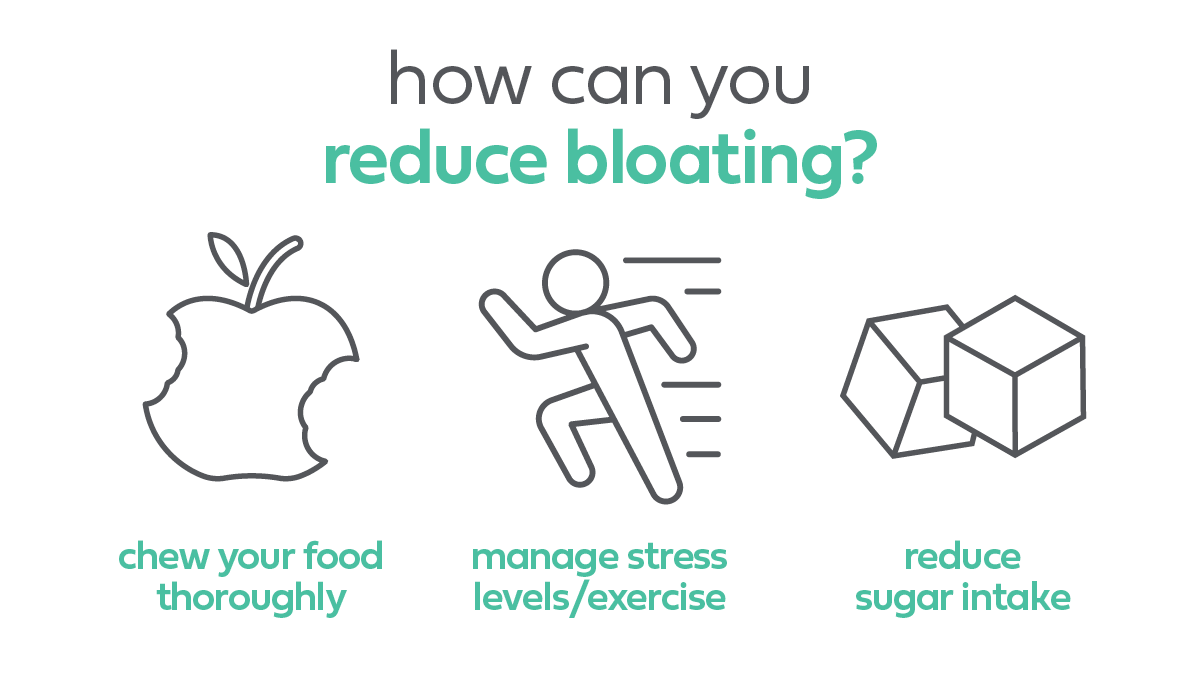 When it comes to how to reduce bloating, there are a number of top tips to try. While we know that diet is a significant contributing factor in how to avoid bloating, it’s not just about what we eat but also the way we eat that can help to support our gut health and prevent bloating. It’s also important to think about any lifestyle factors that may be contributing to symptoms and ways in which we can improve them. Here are our top recommendations on how to reduce bloating:
When it comes to how to reduce bloating, there are a number of top tips to try. While we know that diet is a significant contributing factor in how to avoid bloating, it’s not just about what we eat but also the way we eat that can help to support our gut health and prevent bloating. It’s also important to think about any lifestyle factors that may be contributing to symptoms and ways in which we can improve them. Here are our top recommendations on how to reduce bloating:
Chew your food thoroughly: improper chewing or eating too fast and swallowing lots of air (known medically as ‘aerophagia’) can promote bloating. Digestion starts in the mouth, and chewing activates important digestive enzymes that are needed for optimal digestion of food.
Avoid drinking copious amounts of fluids during and immediately after eating: drinking copious amounts of water or fluids immediately before, during or after eating should be avoided. This can dilute stomach acid and important digestive enzymes that are needed to help break down food molecules and to prevent them from fermenting for too long in the gut. Master how to reduce bloating while staying hydrated by sipping water regularly throughout the day rather than drinking large amounts all in one go.
Test for allergies/intolerances: investigate and rule out any potential allergies/food intolerances that could be exacerbating the problem. Learn how to avoid bloating for you by keeping a food diary can help to identify potential trigger foods.
Reduce/manage stress: when we’re stressed or anxious, our digestive system – doesn’t work as efficiently as it should. This affects our ability to break down and digest foods properly, leading to bloating and discomfort. Stress also directly influences our microbiome, leading to dysbiosis. The gut and the brain are connected by the vagus nerve so how we feel emotionally will impact the health of our gut. Read more about the gut-brain axis.
Reduce your sugar intake: this includes refined white sugars and carbohydrates, as these encourage the growth of pathogenic (disease causing) bacteria in the gut and cause dysbiosis.
Supporting the microbiome: as we know the microbiome can have a significant effect on the overall health of our gut and imbalances of gut bacteria can directly cause bloating, it’s important to ensure that we include a varied diet to encourage diversity of friendly bacteria in the gut and minimise bloating (see below for examples of recommended foods to include).
Do probiotics help with bloating?
Probiotics are strains of healthy bacteria that have been shown to have a positive effect on the overall health of the gut, including symptoms of bloating. Probiotics can be included in the diet by way of including prebiotics in the diet (as above) and with the introduction of an external supply of probiotic supplementation, which can help to rebalance the gut microbiome.
Healthy bacteria also help in the production of short chain fatty acids which are responsible for regularity and so can help to prevent constipation (and associated bloating), according to studies.
How can aguulp supplements help with bloating?
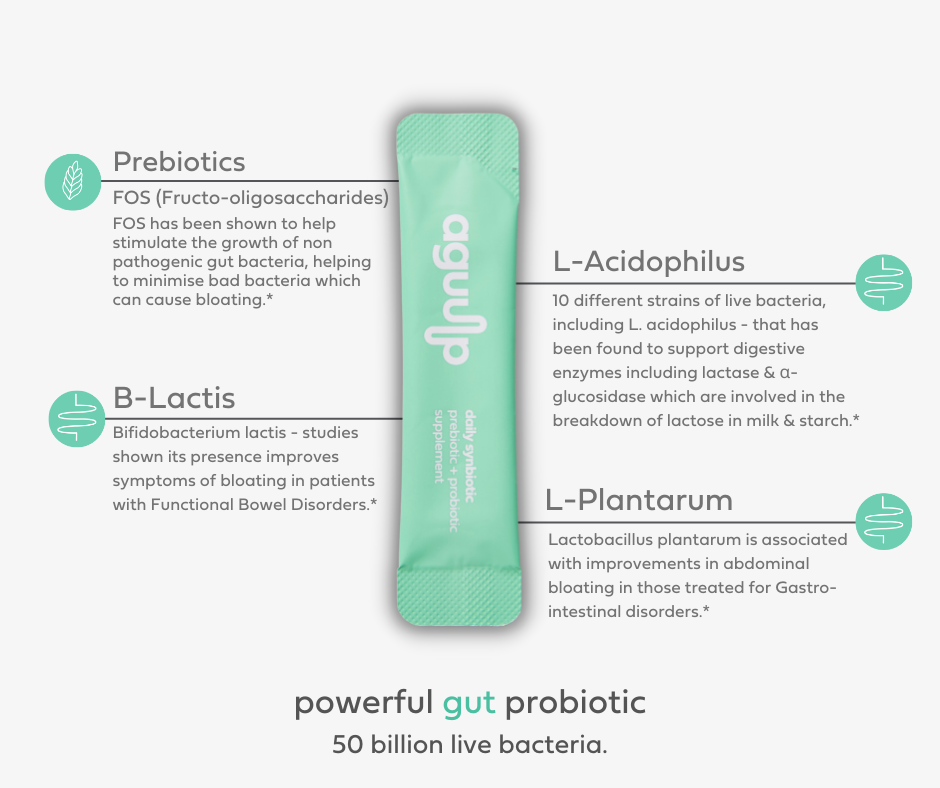
aguulp supplements can also help you to get to grips with how to reduce bloating. Our aguulp daily synbiotic aims to re-introduce more good gut bacteria, which can help address the imbalance of bacteria in the gut. It contains specific strains that have been shown in research to help with gut-related issues, such as bloating;
acidophilus is a highly researched probiotic strain that has been found to support digestive enzymes including lactase & α-glucosidase, which are involved in the breakdown of lactose in milk & starch.
FOS (prebiotic) has been shown to help stimulate the growth of non-pathogenic gut bacteria, helping to minimise bad bacteria that can cause bloating.
Bifidobacterium lactis – studies show bifidobacterium lactis improves symptoms of bloating in patients with Functional Bowel Disorders.
Studies have shown L. plantarum is associated with improvements in abdominal bloating in those treated for Gastro-intestinal disorders.
Find bloating support at aguulp, or shop our full range of liquid supplements for gut health and more today.
References
- Hungin, A. P. S., et al. (2018). Systematic review: probiotics in the management of lower gastrointestinal symptoms – an updated evidence-based international consensus. Aliment Pharmacol Ther, 47(8), pp. 1054–1070. doi: 10.1111/apt.14539
- Ringel, K. T., et al. (2011). Probiotic bacteria Lactobacillus acidophilus NCFM and Bifidobacterium lactis Bi-07 versus placebo for the symptoms of bloating in patients with functional bowel disorders: a double-blind study. J Clin Gastroenterol, 45(6): pp. 518-25.
- Foley A, Burgell R, Barrett JS, Gibson PR. Management Strategies for Abdominal Bloating and Distension. Gastroenterol Hepatol (N Y). 2014 Sep;10(9):561-71. PMID: 27551250; PMCID: PMC4991532.
- Larijani B, Esfahani MM, Moghimi M, Shams Ardakani MR, Keshavarz M, Kordafshari G, Nazem E, Hasani Ranjbar S, Mohammadi Kenari H, Zargaran A. Prevention and Treatment of Flatulence From a Traditional Persian Medicine Perspective. Iran Red Crescent Med J. 2016 Jan 31;18(4):e23664. doi: 10.5812/ircmj.23664. PMID: 27275398; PMCID: PMC4893422.
- Palmer, S. and Dryden, W. (1995). Counselling for Stress Problems. London: Sage.
- Giacosa A, Riva A, Petrangolini G, Allegrini P, Fazia T, Bernardinelli L, Peroni G, Rondanelli M. Beneficial Effects on Abdominal Bloating with an Innovative Food-Grade Formulation of Curcuma longa and Boswellia serrata Extracts in Subjects with Irritable Bowel Syndrome and Small Bowel Dysbiosis. Nutrients. 2022 Jan 18;14(3):416. doi: 10.3390/nu14030416. PMID: 35276778; PMCID: PMC8839120.
- Haniadka R, Saldanha E, Sunita V, Palatty PL, Fayad R, Baliga MS. A review of the gastroprotective effects of ginger (Zingiber officinale Roscoe). Food Funct. 2013 Jun;4(6):845-55. doi: 10.1039/c3fo30337c. Epub 2013 Apr 24. PMID: 23612703.
- Martin-Gallausiaux C, Marinelli L, Blottière HM, Larraufie P, Lapaque N. SCFA: mechanisms and functional importance in the gut. Proc Nutr Soc. 2021 Feb;80(1):37-49. doi: 10.1017/S0029665120006916. Epub 2020 Apr 2. PMID: 32238208.
